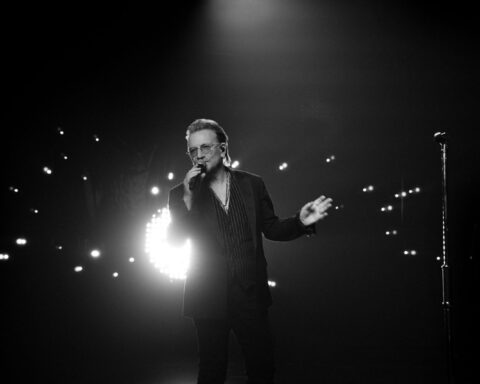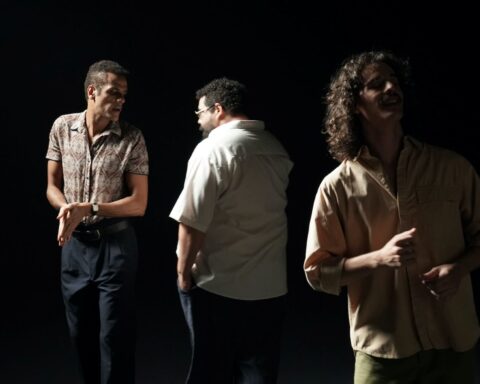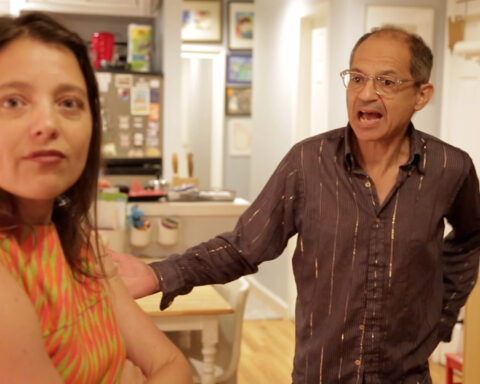OF ALL THE INTERNET FADS to pop up in the last few years, the most addictive may have been “Googlewhacking:” the attempt to devise a two- word Google query that would return only one result. The trick was to juxtapose two completely incongruous things or ideas. Examples posted on the official Googlewhack website include such cognitive-dissonance-mongers as “footlong omnisexuals,” “crewperson desirability” and “barking venlafaxines” (which may or may not have been an underappreciated Captain Beefheart record).
The coming together of Cirque du Soleil and the Beatles in the stage show Love, which recently celebrated its two-year anniversary at the Mirage Hotel in Las Vegas, is hardly the pop-cultural equivalent of a Googlewhack. If anything, this acclaimed artistic cross-pollination between the world’s most spectacular contemporary theatrical troupe and the world’s most enduring pop group—a union initiated by George Harrison before his death in 2001—seems somehow inevitable, a match made in heaven, and in corporate hegemony. But in discussing All Together Now, a documentary account of the show’s rehearsal process featuring new and revealing interviews with Paul McCartney, Ringo Starr and George Martin that’s slated for presentation at this year’s International Documentary Festival in Amsterdam (IDFA), the film’s director, Adrian Wills, makes a Googlewhack-worthy comparison.
“I’ve kind of looked at Cirque du Soleil as being a little like the NFB,” says the 35 year-old filmmaker over his cell-phone from a rest stop somewhere between Ontario and Woodstock, New York, where he’s set to present the film in its latest stop on the festival circuit. Wills is not really finding similarities between the operations of these two venerable Canadian institutions (entertaining though it may be to imagine, say, NFB Commissioner Tom Perlmutter issuing orders from a trapeze) so much as commenting on his unique position as Cirque’s filmmaker- in-residence, having directed several shorts and an intimate making- of doc (Coreto: Behind the Curtain) with the company.
“They were kind of like my second or third film school because they let me do what I wanted to do each time,” he continues. “I’ve never had any sort of big mandate with Cirque. I’ve been working with the same producer [Martin Bolduc] for seven years. I started out by doing small portraits of their artists, and since then, they’ve been giving me gigs. As an independent filmmaker, it was a great way to keep learning the craft and keep working. With All Together Now, they didn’t really hire me to do a film right away. It was more like ‘hey, could you shoot some stuff for us?’ And they had other people who were kind of messing around. Eventually a lot of people wanted to do something, but I was the one who was there, and I was the one who was shooting.”
Wills did a lot of shooting—over two hundred hours’ worth, by his estimation. And, amazingly, he did so without much certainty that the film, which was not commissioned by Apple [the massive company that owns the rights to all things Beatle], would ever see the light of day. “We used to joke that this was going to be the most expensive film ever made that only my mother would see,” he laughs.
“At first, Apple, didn’t really know what we were doing. And then we couldn’t cut it in a post-house because, by that point, Apple was concerned, not about the movie but that the music [an original soundscape of remixed and remastered Beatles’ tunes overseen by Sir George Martin himself and released as a chart-topping album in 2006] was going to get out somehow. Nine months into the process, after we had a first cut, we went down to London and showed it to Apple, and that’s when people got on board. I didn’t have people breathing down my neck mostly because they didn’t know what I was doing.”
This is not to suggest that All Together Now feels particularly covert. Wills’ familiarity with Cirque du Soleil’s personnel, including Love director Dominic Champagne, does give the film a certain intimacy, but there’s no sense that the filmmaker is trying to catch his subjects off-guard or undermine their efforts after the fact. One could regard the film’s placid tone as the result of a soft-pedal approach behind the camera, but if Cirque du Soleil happens to be a crack operation that managed to pull off an aesthetically ambitious and logistically complex show on a massive budget, that’s fair enough, especially since there’s precedent for a very different sort of outcome.
“When I did the film for Coreto, recalls Willis, “it was supposed to be a ‘making-of’ that would end with the premiere performance. I’d been following the director for the whole time. And on the first night, the show fell apart. They had to shut it down. It was all over the media, you know, ‘hey, look, Cirque’s new show didn’t go off without a hitch.’ I shot everything. People were saying ‘there’s no way that’s getting into the film, it’s not what Cirque wants,’ etc. When I got into the editing room, I told Martin Bolduc ‘this is the story; I’ve been following it, and I have the whole story that led up to the show getting shut down.’ I said that in any story about a hero, you have to watch him go through something adverse and it ends up bringing him closer to the audience. And the film ended up being released with that footage intact.”
The labours of Love seem to have run more smoothly, save for a few stumbles, like Yoko Ono’s complaint that the sequence set to “Come Together” had recast her husband’s most politicized song as a sleazy pseudo-hippie orgy. (Based on what we see of the rehearsal, she had a point; the footage of the finished number reflects some positive changes). There are also some less confrontational concerns, like Olivia Harrison’s worries that the unreleased demo of her husband’s greatest song, “While My Guitar Gently Weeps,” is too intimate to be incorporated into Love. (She reconsiders after she hears Martin’s splendid, subtly symphonic new arrangement.)
These moments, as well as many happier ones, are recorded unobtrusively by Wills and his crew, who were mostly just trying to stay out of the way. “We did it the same way as we did in Corteo, which was just getting a lot of people to wear mics,” he says. “I’ve been working with the cameraman, Alain Julfayan, for a long time with Cirque, and we went to film school together. I love shooting a lot of close-ups and he’s really good at getting those. We like to call it the Olympics of filmmaking, because we’d have five people at a time wearing mics. [Director] Dominic Champagne was always wearing a mic, and so was his assistant, Gilles Saint Croix. Giles Martin [George’s son, who helped his father with several aspects of the production] wore one at the beginning, but less so after the Beatles really got involved because maybe he was worried that it would compromise things.”
Obviously, Wills didn’t mic the Beatles themselves (that’s always been Sir George’s job), but since they weren’t around much anyway, it didn’t really matter. He did manage to secure sit- downs with Sir Paul and Ringo, the latter of whom seems to have provided the director with a small bone of contention. “The interview with Ringo Starr was 16 minutes in length, and only 12 minutes are in the film. That gives you some idea of how that interview went,” says Wills. He won’t allow himself to be pushed on this cryptic remark, but the implication seems to be that Starr—whose self- consciously hip-oldster appearance recalls Harry Shearer’s For Your Consideration character after his TRL-friendly image makeover and who seems to be straining to act convivial—said some things he’d rather not be on the record.
McCartney, by contrast, comes off as utterly relaxed during his segments, to the point where he unapologetically notes that his first reaction to the Love premiere was to whisper to Ringo: “we were a fucking great band.” “He was really open with me,” says Wills, who cops to having been slightly intimidated before the sit-down. “He had me up to his hotel room and it was really just like we were chatting.”
The most revealing material in All Together Now, however, concerns a Beatle who did not live to see Love. Martin tells an amazing story about his last meeting with John Lennon and how unsatisfied he was with some of the Beatles’ recordings, including his signature song “Strawberry Fields Forever.” “[Lennon] told George that he was unsatisfied with everything,” says Wills. “And then George asks him ‘well, what about “Strawberry Fields?”’ And Lennon said ‘especially “Strawberry Fields.”’ I think that gives us an idea of what their working relationship was like, and about what John was like, too.”
Wills’ affection for Martin, who put together the Love album despite his failing hearing, is apparent throughout the film, and he’s just as effusive a year after the fact. “I was blown away by George Martin. There are only a few people who I’ve met in my life who are like that. He’s just this consummate gentleman. I think he really gave a lot of the energy not just to that film, but to that show, to the people who were watching him work on a daily basis. There wasn’t a star factor with Martin. He’s a guy who’s made history, but he’s just so generous.” There’s a lovely shot towards the end of the film where Wills’ camera catches Martin embracing his son Giles after Love’s triumphant premiere. It registers as a genuine moment of connection in a sea of VIP photo ops.
“Giles Martin is the same age that George Martin was when he signed the Beatles,” says Wills. “He’s 36, and now he’s working with his father, who’s lost some of his hearing, and they’re doing this music together. And I just thought ‘wow, what an amazing story.’ How many people get to do that with their father— especially when the father is this sort of mythic character?”
This emphasis on small-scale human drama helps to balance the more spectacular dimensions of the film. Wills has a talent for framing stagecraft and the scenes of Love, the finished product, are remarkable, especially the “Day in the Life” number, which references the death of John Lennon’s mother Julia in an automobile accident (and, by showing us that it’s possible to pull a car apart on stage via wires, raises our hopes for a potential Transformers musical).
“I think that that’s one of the best numbers that Cirque has ever done because I think they really get a sense of the grandiose,” says Wills, who notes that there were some other, even more stunning scenes that he couldn’t put in the film because “they just didn’t translate to camera. ‘Lucy in the Sky With Diamonds’ starts out in a dark room and then these little LEDs come on so it’s like you’re at a concert and everyone’s holding up lighters. And then all of a sudden, you know, the song starts and this guy comes onstage with a kind of cannon/ladder thing and then this girl goes up it and she flies over the audience. It’d never play to camera. It would look pretty cheesy. But watching it, being there, you’re really moved the same way you’d be moved at a rock show.”
He’s hesitant, however, to offer an opinion of Love as a whole, noting that it’s hard for him to remain objective after spending a year with the company. “I watched it being built all the way though, at different levels. And with Corteo, I couldn’t tell you what I thought, either. I have ideas of what I thought it was going to be when they were preparing everything, and then I saw how it turned out and how the audience takes it—it’s an ever-changing process. That’s why for me, the films aren’t really about the shows.”
The question of what Wills’ next few films might be about is worth asking in light of his recent stint at the Canadian Film Centre, where he directed a short dramatic film called The Hunt. “Like everybody and their dog, I’m trying to break into features,” says Wills, who attended film school at Concordia and lives and works in Montreal (although he was born in Newfoundland and grew up in Melbourne). “I’ve got a couple of things I’m trying to get done. I’m trying to do this one, maybe in French, about a kid who comes from a broken home and hooks up with his cousin who is in a street circus, but they have to finance themselves by being criminals, and so he gets involved in that world.”
Wills laughs when it’s suggested that he can’t seem to get away from the circus in his work. And he’s good-humoured about the different kind of circus he’s experiencing in the run-up to _All Together Now_’s October theatrical release. “Being at Hot Docs and being voted in the festival’s top ten was great,” he recalls. “Martin Bolduc and I keep calling this film ‘the little engine that could’ because there were no expectations at all. For it to be where it is now is fantastic. You’d think that with two big companies involved, it would have been pushed in a different way, but neither of them is a film company. You have a music company that cares about music and a circus company that cares about the circus.”
So he just sort of snuck through the middle, then? “Yes, through the middle,” Wills says after a moment. “I like that.”











